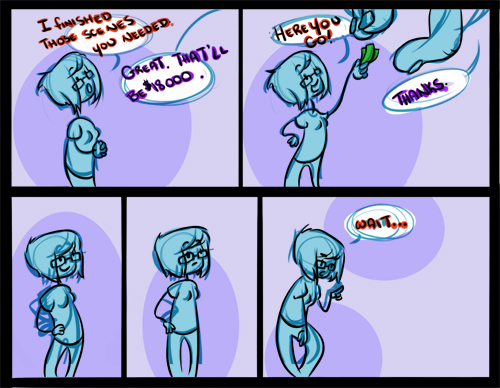Last updated on April 28, 2012
From the publisher: (Mike!) Yesterday’s big story here, and on a few other like-minded sites, was the new business model being espoused by Digital Domain CEO John Textor, whereby students at their new government-funded school are paying tuition to work on the feature films their new animation studio, Tradition Studios, is producing. In his own words, the students are going to “be labor that’s actually paying us for the privilege of working on our films“. It’s a brilliant plan, and might be illegal, and is making me, and a lot of other people in our field, very angry. One of those people is our very own Rebecca David. Rebecca is our Social Media Ninja, so really, I have no idea what she does. Rebecca is also a hard-working cog in the giant machine that is the animation industry. So today I’m going to get out of the way and let you read someone else’s opinion. Go easy on her, it’s first article.

Hey guys, it’s Beccy. Whether you’ve noticed or not, I am the resident Social Media Ninja around here and since we’re going to talk I thought I would introduce myself.
I am a recent graduate of the Traditional Stream of the Animation Program at Algonquin College. Previous to that, I took the Pre-Animation program at that same school. Suffice it to say, I worked myself through 4 years of post-secondary education. I held a part-time job the whole time, living at home with my parents (for the first 2 years) and sacrificing nutrition, sleep and a social life in order to get out of school and into “The Industry” with as little debt saddled on me as I could.
Mine is a modest success story so far, I graduated in May 2011 debt-free with a demo reel and a lot of hope. Within 6 months I landed my first, and current, job as a Character Builder on the PBS show Wild Kratts. Not everyone can say what I can say, that they work on a show they like, that they work under their childhood heroes (come on guys, Kratt’s Kreatures? Zaboomafoo? My head spins some days) and they get to have weekends off. But when you have a job, there are things that everyone ought to be able to say. The most important of those statements is this:
I get paid to do my job.
And while we’re on this thread, let’s name a thing that you should never say about the work you do:
I pay someone for the privilege of doing my job.
That sounds pretty ridiculous, doesn’t it? I mean, the whole point of a job is that it makes you money. In exchange for your services and time, you are compensated. Now, around here we have opinions on unpaid internships. I don’t like them. To be specific, I do not like it when eager students take positions where they do work that is part of actual production that then goes on to turn a profit. I get all shake-y and incoherent just thinking about it. Now, let’s turn things up to 11.
Digital Domain is charging students tuition dollars to work for them. They have opened up a school of sorts, where in exchange for student funds and government subsidies, they will allow you to work on their films.
This is happening down in Florida, where it’s being portrayed as a magical happening. And it sounds fantastic, doesn’t it? Go to Florida State University, pay them all the money you don’t have for tuition and then some extra for food and shelter while you’re there. Then go meld yourself into a workforce at Digital Domain, where they let you work to your little hearts content on Ender’s Game or some other project (they apparently have many). Think of the opportunity! The connections! The work experience! The projects you can put down on your CV! The EXPOSURE you’re going to get.
This is not okay. It’s not okay at all. Now I’m going to tell you why.
1. You’re taking work from people who want to get paid.
If you’re paying to work, then you are a taking a seat from someone who would like to be working to get paid. That could be someone who has been in the industry for a decade, or someone who just graduated and is looking to pay off their student loans with their brand-new skill set.
2. You’re teaching ‘the suits’ that they aren’t required to pay you.
Business folk are business folk, it is their job to make as much profit as possible. If you remember junior high math:
Profit = Revenue – Cost
Cost is things like rent for the building, the rights to whatever content you’re producing, the software for the production, the hardware for the production, and the crew that makes all the wheels spin. That’s you. You are part of the cost, so if they can pay you nothing they will. Except now you aren’t just free, you’re counting yourselves amongst their revenue. So now the equation looks a little more like this:
Profit = Revenue + Your Tuition + Government subsidies – Cost.
The suits of the world knows how profitable it is. They’ve picked out Digital Domain Media Group as a business to keep an eye on, with their potential profit margins.
3. The education system will indoctrinate you into thinking your work is not worth any money.
In fact, it’s teaching you that you are worth negative money. You are in debt to these people for being permitted to work for them. We exist in a market where people are constantly trying to undervalue our efforts. They think because you’re doing something you love that money doesn’t matter. They don’t understand the process of the work, so it must be easy, why would they give you a living wage?
My teachers were wise, they told me never to work for free, to always get a contract (even though that won’t always save you) and many other things so that I would be prepared for when someone tried to screw me out of money I deserved. Instead, this program will teach you that you aren’t worth paying for. They won’t tell you directly, but it’ll be there, under your skin. So when you graduate, you’ll hop on over to an unpaid intern-ship with the promise of paying work in the future, only maybe they forget to pay you ever.
4. You’re skewing the curve for the rest of us.
The one thing that could be said for this program is that I guarantee you will learn mighty fast. They can coach, lecture and tutor you all you want, but in an industry like this one they aren’t lying when they say that nothing beats hands-on experience. I learned more about ToonBoom Harmony in my first 2 weeks of work than I did the 2 years they taught it to us in school. It has nothing to do with the competence of my teachers and everything to do with the fact that if you do something every day for 8-16 hours a day and it has to be done right because it’s going to be shipped somewhere else, you’re going to pick it up quick because there’s no other choice.
So you’ll graduate with all these skills, and a studio will pick you up for a (gasp!) paying gig. You’ll be great at it, but they’ll pay you half of what you deserve because you’re a fresh graduate. You will take the job, because you’re a graduate and you like eating. As a result, maybe that studio won’t hire a graduate from another school, and their skills go un-nurtured. They go work at EB Games for 10 years. The notion of what a graduate should be able to accomplish is hiked up, so an industry already wary of investing in the fresh-faced and shiny will lean even further into their rut of hiring only people who’ve already been working for 5+ years (and you, they’ll hire you. And they’ll pay you. A bit.)
—
In my indignation, it’s easy to read about what’s happening and think of all the evil business men sitting around in their fancy suits. They tent their fingers and chuckle, “Oh those artists. We got them. Who’d have ever thought we could convince them to not only work for free but to give us money for it?”. Their cackles echo through their board room, and then a shapely woman in a red dress brings them a round of Scotch.
Sorry, that’s a bit dramatic. It would actually probably be easier if that’s how it worked. The more likely situation is that this happened in baby steps. I bet a lot of people firmly believe that they are helping students out by having them make up 30{f2e86ea6af82e2bb048871abf045622abf0ed27fb513932dc1ee8c05a54cbefd} of a workforce in a studio. No one individual thinks they’re doing anything wrong when someone who is eager to work is allowed to do so. Supervisors are not unlike teachers, so what’s the problem with paying tuition to learn things that I’ll have to learn eventually.
But you know it’s wrong. It’s reflected in every time someone takes an unpaid internship. Every time the people with the money ask us to make their show Disney quality for Flash prices. Every time a big-deal company runs a ‘contest’ for free spec work instead of paying an animator/graphic artist/studio team their due. It is directly reflected in the fact that the CEO of Digital Domain is walking around bragging about it like he’s the smartest man there is!
Something needs to be done. When I say ‘something’ I do not mean ‘sit around on Twitter and bitch about it’. I mean writing emails to anyone in any position of power so they know we don’t like it. I mean contacting anyone who might matter, so that any person functioning under the impression that this is a good thing gets their minds changed. I mean telling everyone about it, so that we are immunized against this kind of thinking.
There is one final way to start fixing this:
Do not enroll in this program.
The current round of classes sits at 20 people, but they are building a new complex and are projecting attendance in the thousands. If no one goes, they will have to cease. This is easier than refusing low-paying work, because you are saving money. We cannot continue to let ourselves be taken advantage of.
Nothing speaks louder than the Almighty Dollar.
– Rebecca David
Social Media Ninja
@Nieklot
Special thanks to VFX Solider for calling this to my attention with their article.
The legality of their entire venture is also already being called into question, which TAG has addressed in their own article.






screw the big studios. screw the animation industry. your movies all SUCK.
Well, I’m not sure if that exactly counts as constructive.
Unfortunately the concept of getting students to do your work for you is not new. I understand that Frank Lloyd Wright used the same concept with his students.
In today’s world, one would think that there should be laws in place to protect the experienced worker and the student/intern. The former shouldn’t be in a position of losing his job to an employee who isn’t getting a salary and the student shouldn’t be slave labour, but only there to observe and learn. If the government can’t or won’t do something about the labour laws, perhaps other solutions, mainly unionization, should be explored.
Your arguments come across as self centered, as in, you shouldn’t go to this school because it’ll affect you personally.
There are plenty of reasons why someone shouldn’t want to be involved with this because it doesn’t make sense for them or anyone else.
Do they really expect people to believe DD will hire graduates? Why not just use the students.
They should be concerned that their work will not be their own. They won’t get to show off something that us completely their own idea if they are doing service work during school as “assignments.”
Your portfolio from a traditional school will more creative. You get a chance to do things the way you want wwithin the parameters of the school. Animation production is a dictatorship, and you wont be in a position to do the more creative work.
The list goes on.
We seriously need some organization – this is a US problem for now, but if nothing happens there – I’m sure we’ll see similar ‘schools’ here in no time, and in 5year all of us will be out of work.
I was a pessimist, tired of being f*** over on every step, finally considered changing career, but then Openmedia did a tremendous job of stopping those proposed ‘no-competition bills’ pushed by Rogers and Bell as well as the ridiculous ‘spying-without-warrant’ bill recently proving that if people join a cause they’ll make a change.
Too bad most of us are cowards and do nothing, only compain..
I think we’re going to see more and more partnerships with studios and schools in the future. That is actually a very good thing. The conversation that keeps going back and forth is that there is a gap between what is taught in school, and what the industry needs grads to know (that can and probably should be a whole other discussion). I’ve had that conversation more than a few times, so i think this kind of collaboration is good.
I do see a few issues that arise in this specific agreement.
Studios shouldn’t be profiting from student work. The arguments are obvious, and already outlined by the author.
Ideally the project should be something developed internally like a test for RnD, or its a short film etc. It should be a training and development platform for students, to help bridge the gap into the industry, and not a place for the company to profit from free work.
After looking at the application form for DDI, I see that those students are required to have a minimum of 6 hours a week of instruction (can be more) plus a three hour lab per class over the weekend hours. The school has to take into account time for home work, so i suspect the actual time DD could expect, would be three days a week or less. The internship also states that 150 hours is the minimum requirement to be made over two semesters for the course credit. That would total 5 hours a week, for 30 weeks (assuming a 15 week semester). The way it seems to be laid out from the schools perspective seems like a good move. If those were the actual hours in studio, or even slightly higher I don’t think there would be so much talk about the program. I do believe however, that the onus lies with both parties to ensure that the students are not taken advantage of. It sounds like FSU is not really paying attention to how money hungry the studio is, while DD is trying to dine and dash before anyone notices.
Tell it like it is Rebecca.
As Bill Marks, infamous Canadian publisher/producer, and exploiter of such artists as Ty Templeton, Seth, and Los Bros Hernandez used to say, and I quote: “Artists is soooooooo stupid.” For a completely different model, look at the Canadian Centre for Film Studies (where Bill Marks ended up). They give students the knowledge how to fill out grant forms and make their own films, then bask in the glory of their alumni. A little more healthy.
Alan,
I don’t think all my arguments come off as self-centred. I do believe I touched on how going to a school like this changes the mentality about paying skilled people for skilled work (even more than it is already being messed with) etc.
I worded it in a direct affect way, however, because I feel like a lot of people need to feel like an issue will affect them personally (whether short or long term) in order to become properly invested in a problem.
I agree with all the other reasons you listed not to go to that school! They are exactly right as well, but also just as if not more individualised than mine.
Unless you mean self centred as in specifically me, Rebecca, me. In which case I could not disagree more. I wrote this because I would like it if people were indignant about something on behalf of the community of talent that we all represent. Especially since in most cases we do not have unions to do that job for us (which is a whole other topic.)
I do not “really” expect a lot of things. I wish for a lot of things. But if we just give up because we think we shouldn’t “really” expect things, then they win.
Rebecca makes perfect sense.
She\s simply stating what everyone …(Well…lots of seasoned people anyhow) feel but are so terrified to lose their jobs they just tow the line and actually even sometimes defend these practices out of a mistaken sense of security and loyalty. The rug can and WILL be pulled from under all animation proffesionals eventually and then it dawns on em..oh..Maybe I should have…bleh bleh bleh…Rebecca is smart enough to see it from a totally neutral standpoint. I applaud her guts. She’s a breath of fresh air.
I think we as artists should go on strike, just like the writers strike. Or maybe just send them a black picture that says there would be art here if you actually paid for it . . .
Nice article, fight the good fight-
Cheers
What’s the difference from a program that offers co-op and this? Schools like Sheridan,Waterloo, etc offer co-op/intern opportunities as credits which are put towards your degree.
The difference is that intern/co-op programs are either paid gigs + school credit OR the students in the program are not doing any tasks that go on directly towards production. Their tasks are more like some simple office work (photocopies, phones etc) coupled with mentorship where any studio work they do is training (like re-doing a scene that has already been approved, storyboard samples from a show that has already aired etc) that is looked over by people who are actively familiar with current industry standards. Thus, learning.
What DD is doing is no different than Spinmaster, a toy manufacturer in Toronto going to all the colleges including Sheridan and for the price of pop, pizza and and a cash prize essentially looking for ideas from those students, dumb enough to sign a waiver form and let the company take their IP.
work for free, or steal IP for the what amounts to pennies.
this all has to stop. If a billion dollar corporation has to do this, those running the company must be both leaderless and creatively dead.
Students need to wake up to the exploitation that is taking place
I just spent a class with my students talking about common traps used to get work out of them and how to spot potentially crappy clients/employers. I don’t think I mentioned anything like this because it seems so obvious it’s a bad idea to me, but if I were back in school and worried about getting a job… Well this seems like a way to get around the catch-22 of can’t get a job without experience, can’t get experience without a job. I’m not saying I agree with it morally, but I do understand the appeal.
We have a much nicer version of this in Oromocto, NB with a military base that “hires” students based on their portfolio/demoreel and pays them a liveable wage. They require a tuition payment or two but it’s at the community college level so about as much as you’d spend on a junker car. It’s a somewhat slower paced, educational environment but everything is project based like a studio so it seems to me like a great inbetween of the industry and schools. That sounds to me like a better option we should embrace.
The set-up you guys have in Oromocto seems fantastic, and definitely the kind of education that many students are looking for!
The thing about education is you are of course expected to pay for it. It’s when someone turns around and pulls profit from the work you’re doing and you see none of it that my heckles get all up. Especially when they run around gloating about it.
Your demo reel doesn’t work Rebecca….
I just went and watched it on my portfolio site and it’s working fine for me?
It’s uploaded to youtube and then embedded. What browser are you using/what site are you looking at in on?
If you wouldn’t mind emailing me about it. (rb (at) canadiananimationresources (dot) ca that’d be rad.
Rebecca,
I didn’t mean to be blatantly accusatory. All I meant with that statement was that a lot of people are reacting to the situation that is preaching to the choir – we all feel the same way as you mention in your post.
The way your arguments are framed, such as
“You’re taking work from people who want to get paid.”
“You’re skewing the curve for the rest of us.”
We all see and agree with this.
But it’s far more constructive to present an argument to the people who will actually be able to affect change in this issue itself – mainly the people who would consider going to the school, and the legislators who are being spooked into passing this through.
You’re right. Creativity in your education is really important. I appreciate you taking the time to add to the discussion, as it’s true that I was mostly taking this issue as a matter of (for lack of a better term) dishonour and thievery.
The points you made are sound arguments that any student would want to take under consideration when choosing a school/program to attend. I encourage everyone to use them and I’ll add them to my arsenal the next time someone tries to tell me DDI and their new studio is a ‘win-win’ situation. Thank you.
[…] Editorial – Working = Money, right? […]